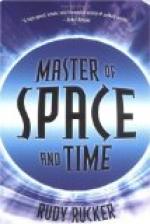As a boy he exhibited a genius for invention, as well as for acoustics. Much of this was duo to the wise encouragement of his father. He himself has told of a boyhood invention.
My father once asked my brother Melville and myself to try to make a speaking-machine, I don’t suppose he thought we could produce anything of value, in itself. But he knew we could not even experiment and manufacture anything which even tried to speak, without learning something of the voice and the throat; and the mouth—all that wonderful mechanism of sound production in which he was so interested.
So my brother and I went to work. We divided the task—he was to make the lungs and the vocal cords, I was to make the mouth and the tongue. He made a bellows for the lungs and a very good vocal apparatus out of rubber. I procured a skull and molded a tongue with rubber stuffed with cotton wool, and supplied the soft parts of the throat with the same material Then I arranged joints, so the jaw and the tongue could move. It was a great day for us when we fitted the two parts of the device together. Did it speak? It squeaked and squawked a good deal, but it made a very passable imitation of “Mam-ma—Mam-ma.” It sounded very much like a baby. My father wanted us to go on and try to get other sounds, but we were so interested in what we had done we wanted to try it out. So we proceeded to use it to make people think there was a baby in the house, and when we made it cry “Mam-ma,” and heard doors opening and people coming, we were quite happy. What has become of It? Well, that was across the ocean, in Scotland, but I believe the mouth and tongue part that I made is in Georgetown somewhere; I saw it not long ago.
The inventor tells of another boyhood invention that, though it had no connection with sound or speech, shows his native ingenuity. Again we will tell it in his own words.
I remember my first invention very well. There were several of us boys, and we were fond of playing around a mill where they ground wheat into flour. The miller’s son was one of the boys, and I am afraid he showed us how to be a good deal of a nuisance to his father. One day the miller called us into the mill and said, “Why don’t you do something useful instead of just playing all the time?” I wasn’t afraid of the miller as much as his son was, so I said, “Well, what can we do that is useful?” He took up a handful of wheat, ran it over in his hand and said: “Look at that! If you could manage to get the husks off that wheat, that would be doing something useful!”
So I took some wheat home with me and experimented. I found the husks came off without much difficulty. I tried brushing them off and they came off beautifully. Then it occurred to me that brushing was nothing but applying friction to them. If I could brush the husks off, why couldn’t the husks be rubbed off?




